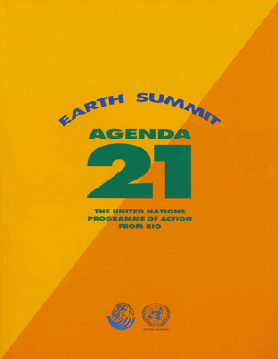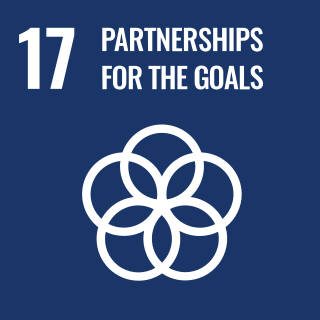
The United Nations Economic and Social Council is one of the six principal organs of the United Nations, responsible for coordinating the economic and social fields of the organization, specifically in regards to the fifteen specialised agencies, the eight functional commissions, and the five regional commissions under its jurisdiction.

Agenda 21 is a non-binding action plan of the United Nations with regard to sustainable development. It is a product of the Earth Summit held in Rio de Janeiro, Brazil, in 1992. It is an action agenda for the UN, other multilateral organizations, and individual governments around the world that can be executed at local, national, and global levels. One major objective of the Agenda 21 initiative is that every local government should draw its own local Agenda 21. Its aim initially was to achieve global sustainable development by 2000, with the "21" in Agenda 21 referring to the original target of the 21st century.
The Forest Principles is a 1992 document produced at the United Nations Conference on Environment and Development. It is a non-legally binding document that makes several recommendations for conservation and sustainable development forestry.
The Global Policy Forum (GPF) is an international non-governmental organization founded in December 1993 and based in New York and Bonn .[1] The aim of the Global Policy Forum is to critically accompany and analyze developments in the United Nations and on the topic of global governance. Thereby a bridge between the international and the local level is to be built. GPF seeks to strengthen intergovernmental organizations and promote multilateralism based on solidarity, international law and the United Nations Charter. The Global Policy Forum also has consultative status on the United Nations Economic and Social Council. Jens Martens has been the GPF's executive director since 2014 and director of GPF Europe since its foundation in 2004.[2]
The United Nations Volunteers (UNV) programme is a United Nations organization that contributes to peace and development through volunteerism worldwide.

The inaugural session of the Black Sea Forum for Partnership and Dialogue (BSF) was held on June 4–6, 2006 in Bucharest. The Forum is a Romanian initiative, initially meant to hold annual presidential-level summits and thematic or sectoral-cooperation meeting during those annual intervals. The Forum is not meant to create new regional institutions, but rather to turn into a regular consultative process among countries of the extended Black Sea region and between this group of countries and international organizations such as the European Union. After the inaugural summit, no other summits were planned.

The United Nations Department of Economic and Social Affairs is part of the United Nations Secretariat and is responsible for the follow-up to major United Nations Summits and Conferences, as well as services to the United Nations Economic and Social Council and the Second and Third Committees of the United Nations General Assembly. UN DESA assists countries around the world in agenda-setting and decision-making with the goal of meeting their economic, social and environmental challenges. It supports international cooperation to promote sustainable development for all, having as a foundation the 2030 Agenda for Sustainable Development and the 17 Sustainable Development Goals (SDGs) as adopted by the UN General Assembly on 25 September 2015. In providing a broad range of analytical products, policy advice, and technical assistance, UN DESA effectively translates global commitments in the economic, social and environmental spheres into national policies and actions and continues to play a key role in monitoring progress towards internationally agreed-upon development goals. It is also a member of the United Nations Development Group.

Felix Dodds, born Michael Nicholas Dodds, is a British author, futurist, and activist.
Baltic 21 is a plan to cooperate on implementing regional sustainable development. It is managed by the Council of the Baltic Sea States (CBSS).
The World Forestry Congress (WFC) is the largest and most significant gathering of the world's forestry sector and it has been held every six years since 1926 under the auspices of the Food and Agriculture Organization (FAO) of the United Nations, organized by the government of the host country. It is a forum for the sharing of knowledge and experience regarding the conservation, management and use of the world's forests, and covers such issues as international dialogue, socio-economic and institutional aspects, and forest policies.
The Regional Forum on Environment and Health in Southeast and East Asian Countries is a global framework for action provided by Agenda 21 of the 1992 United Nations Conference on Environment and Development; the Johannesburg Plan of Implementation of 2002 World Summit on Sustainable Development; the Millennium Development Goals of the United Nations and the recommendations of the fifth Ministerial Conference on Environment and Development in Asia and the Pacific on enhancing the environmental sustainability of economic growth. The second Ministerial Regional Forum was held 14–16 July 2010 in Jeju Province, South Korea. The forum is held every three years; the first was in Bangkok in August 2007.

The International Day of Forests was established on the 21st day of March, by resolution of the United Nations General Assembly on November 28, 2013. Each year, various events celebrate and raise awareness of the importance of all types of forests, and trees outside forests, for the benefit of current and future generations. Countries are encouraged to undertake efforts to organize local, national, and international activities involving forests and trees, such as tree planting campaigns, on International Day of Forests. The Secretariat of the United Nations Forum on Forests, in collaboration with the Food and Agriculture Organization, facilitates the implementation of such events in collaboration with governments, the Collaborative Partnership on Forests, and international, regional and subregional organizations. International Day of Forests was observed for the first time on March 21, 2013.
Type II partnerships were developed at the Johannesburg World Summit on Sustainable Development in 2002. Arising in opposition to the state-centred eco-governmentality of previous approaches to sustainable development policy, the partnerships facilitate the inclusion of private and civil actors into the management of sustainable development. The partnerships are employed alongside traditional intergovernmental mechanisms in order to effectively implement the United Nations' Agenda 21 and Millennium Development Goals, particularly at sub-national level. Although widely acknowledged as one of the most innovative and effective developments in global environmental governance in recent years, the partnerships have faced criticism due to fears of a lack of accountability, and the risk that they may exacerbate inequalities of power between Northern and Southern states. Despite these reservations, there is a general consensus among state and non-governmental actors that Type II partnerships are a significantly progressive step in global environmental governance in general, and sustainable development discourse in particular.

The International Institute for Sustainable Development (IISD) is an independent think tank founded in 1990 working to shape and inform international policy on sustainable development governance. The institute has three offices in Canada - Winnipeg, Ottawa, and Toronto, and one office in Geneva, Switzerland. It has over 150 staff and associates working in over 30 countries.
Multistakeholder governance is a practice of governance that employs bringing multiple stakeholders together to participate in dialogue, decision making, and implementation of responses to jointly perceived problems. The principle behind such a structure is that if enough input is provided by multiple types of actors involved in a question, the eventual consensual decision gains more legitimacy, and can be more effectively implemented than a traditional state-based response. While the evolution of multistakeholder governance is occurring principally at the international level, public-private partnerships (PPPs) are domestic analogues.

The Post-2015 Development Agenda was a process from 2012 to 2015 led by the United Nations to define the future global development framework that would succeed the Millennium Development Goals. The new framework, starting from 2016 is called Sustainable Development Goals.
Habitat III, the United Nations Conference on Housing and Sustainable Urban Development, took place in Quito, Ecuador, from 17 – 20 October 2016.

The Global Landscapes Forum (GLF) is a multi-stakeholder forum that facilitates participation in landscape approaches.

Sustainable Development Goal 17 is about "partnerships for the goals." One of the 17 Sustainable Development Goals established by the United Nations in 2015, the official wording is: "Strengthen the means of implementation and revitalize the global partnership for sustainable development". SDG 17 refers to the need for the nonhegemonic and fair cross sector and cross country collaborations in pursuit of all the goals by the year 2030. It is a call for countries to align policies.

Sustainable Development Goals and Nigeria is about how Nigeria is implementing the Sustainable Development Goals within the thirty-six states and its Federal Capital Territory (FCT). The Sustainable Development Goals (SDGs) consist of seventeen global goals designed as a "blueprint to achieve a better and more sustainable future for all". Each of the 17 goals is expected to be achieved by 2030 in every country around the world.











